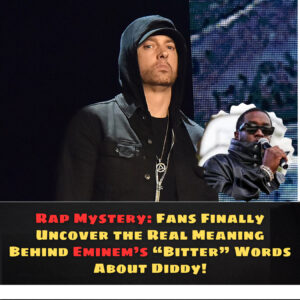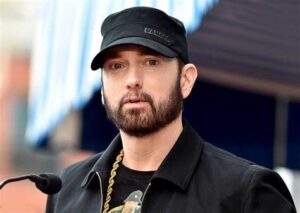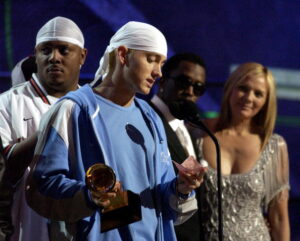Here's ads banner inside a post

Rap Mystery: Fans Finally Uncover the Real Meaning Behind Eminem’s “Bitter” Words About Diddy!
Eminem, the rap god known for his razor-sharp lyrics and unfiltered storytelling, has once again ignited the music world with a lyrical controversy that has fans buzzing. For years, the hip-hop community has speculated about the true meaning behind some of Eminem’s most pointed verses, particularly those aimed at industry mogul Sean “Diddy” Combs. Now, after a deep dive into the enigmatic lines, fans believe they have finally cracked the code behind Eminem’s bitter words, unveiling a hidden narrative that goes beyond mere rap beef.
The Lyrics That Sparked the Debate: A Closer Look
Eminem’s complex relationship with Diddy has been a topic of intrigue for years. The tension between the two heavyweights dates back to the early 2000s, when Eminem frequently used his platform to call out industry hypocrisy and the powerful figures behind the scenes. In particular, a verse from his song “Killshot” — a diss track aimed at Machine Gun Kelly, who was then signed to Diddy’s Bad Boy Records — caught the attention of fans and critics alike.
Here's ads banner inside a post
In “Killshot,” Eminem raps, “The day you put out a hit’s the day Diddy admits / That he put the hit out that got Pac killed.” The line was immediately controversial, referencing the long-standing conspiracy theory that Diddy was somehow involved in the murder of rap legend Tupac Shakur — a claim that has never been substantiated but continues to fuel debates in hip-hop circles. At the time, many dismissed the line as a mere jab at MGK and a shock tactic by Eminem. However, recent revelations suggest there’s more to the story.
Unpacking the Layers: What Fans Discovered
After years of speculating, dedicated fans have pieced together clues that point to a deeper meaning behind Eminem’s biting words. For some, the verse was a veiled critique of the broader culture of violence that has plagued the hip-hop industry, implicating Diddy not as a literal suspect, but as a symbolic figure representing the darker side of rap’s commercial empire.
Analyzing the lyrics alongside Eminem’s broader body of work, fans argue that his words were less about Diddy personally and more about the complex and often toxic dynamics within the music industry. Eminem, known for his disdain for corporate control and exploitation, seemed to be making a statement on how powerful industry figures manipulate narratives, control artists, and sometimes, knowingly or unknowingly, perpetuate cycles of violence.
Here's ads banner inside a post

In fan forums and social media discussions, a common theme has emerged: Eminem’s verse wasn’t about accusing Diddy of murder but about highlighting the often ignored reality of how dangerous the rap game can become when power, ego, and money collide. As one fan eloquently put it, “It’s about the whole system, not just Diddy. Em’s calling out the entire industry for being complicit in creating the conditions that led to tragedies like Tupac’s death.”
Eminem’s History with Diddy: A Complex Relationship
To fully understand the significance of the lyrics, it’s important to look back at Eminem’s history with Diddy and his label, Bad Boy Records. While the two have never had a direct feud, they have often been on opposite sides of the hip-hop spectrum. Diddy, a master of commercial rap and mainstream appeal, built an empire on glamour, success, and larger-than-life personas. Eminem, on the other hand, rose to fame by challenging those very ideals, often positioning himself as the anti-hero who exposed the underbelly of the music business.
The friction between these two worlds has always been palpable. Eminem’s brand of truth-telling and Diddy’s pursuit of power and influence represented a clash of philosophies. Eminem’s callout on “Killshot” was not just a random attack; it was a reflection of years of pent-up frustration with an industry that, in his eyes, too often prioritizes profit over integrity, safety, and truth.
In retrospect, fans now see the verse as a pivotal moment where Eminem used his platform to push back against the silent complicity that has long haunted the genre. It’s a reminder that for every glamorous award show and chart-topping hit, there’s a darker side to the industry that needs to be acknowledged.
The Broader Implications: Hip-Hop’s Love-Hate Relationship with Controversy
Eminem’s verse about Diddy taps into a broader narrative within hip-hop — one where truth, myth, and spectacle often intertwine. In a genre built on storytelling, bravado, and sometimes outright confrontation, Eminem’s words reflect the ongoing struggle between artists who seek authenticity and an industry that often demands theatrics.
The revelation of the deeper meaning behind Eminem’s lyrics serves as a reminder of the complexities of hip-hop culture. It’s a space where artists can simultaneously be truth-tellers, provocateurs, and entertainers. But it’s also a realm where the lines between reality and performance are constantly blurred, leaving fans to decode what’s real and what’s merely for show.
This latest interpretation of Eminem’s lyrics has reignited debates about the responsibility of artists when addressing sensitive topics, especially those that touch on unresolved tragedies and conspiracy theories. While some see Eminem’s words as a necessary critique of an industry complicit in its own scandals, others argue that such lyrics only serve to muddy the waters and perpetuate harmful narratives.
The Power of Words: Why Eminem’s Lyrics Still Matter
Ultimately, Eminem’s “bitter” words about Diddy are more than just a clever punchline—they’re a reflection of the power dynamics that shape the music industry. The fact that fans are still dissecting these lyrics years after their release speaks to Eminem’s skill as a lyricist and his ability to provoke thought, even when his words seem purely incendiary on the surface.

For Eminem, this moment adds another layer to his already complex legacy. He remains one of the few artists willing to confront the uncomfortable truths of the industry, using his platform to shed light on issues that others might shy away from. In doing so, he continues to push the boundaries of what rap can be—not just a form of entertainment, but a medium for challenging the status quo.
As the debate rages on, one thing is clear: Eminem’s words, no matter how controversial, are never without purpose. For fans, uncovering the real meaning behind his lyrics is part of what makes following his career so compelling. It’s not just about the music; it’s about the narratives, the critiques, and the unspoken truths that lie beneath the beats.
In the end, Eminem’s “bitter” words about Diddy serve as a reminder of the complicated, often messy intersection of art and reality. They prompt us to question the stories we’ve been told and the figures we’ve idolized, challenging us to look beyond the surface and seek out the deeper truths that define the world of hip-hop.

